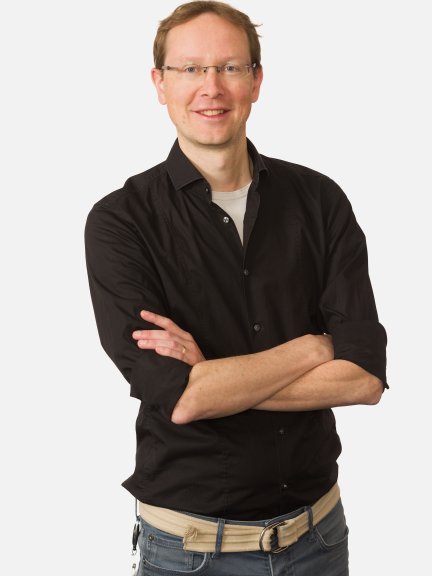Dr. den Dunnen began his career at the Amsterdam UMC in 2004 as a PhD student in immunology. He later specialized in infectious diseases and autoimmunity, gaining experience across multiple departments at both Amsterdam UMC locations. Since 2022, he has been part of CEMM, where he and Jan Paul Medema played a key role in restructuring the departments.
Ambitions and objectives for CIMM
Dr. den Dunnen envisions CIMM as a central hub for infectious disease research, bringing together diverse research groups, since CIMM is now the central laboratory for infectious diseases in the Amsterdam UMC. Already, Carla Ribeiro’s group has joined, and other groups have expressed interest as well. He welcomes collaborations and discussions to foster a strong research community. Dr. den Dunnen: ‘Anyone interested in potentially joining efforts is very much welcome to discuss this over a coffee!’
Dr. den Dunnen’s second goal is to expand research on sepsis, Lyme disease, COVID-19, and post-acute infection syndromes such as post-COVID, post-Lyme, and post-sepsis. With notable success in post-COVID studies, including high-impact publications and extensive research funding, CIMM aims to enhance understanding and treatment of post-acute infection syndromes through randomized clinical trials and the outpatient clinic.
Additionally, Dr. den Dunnen prioritizes sustainability and animal welfare by expanding CEMM’s Green Team initiatives, reducing animal experiments in favor of organoid and in vitro models, and minimizing the use of fetal calf serum (FCS) through implementation of FCS-free alternatives.

Focus and visibility
Previously, infectious disease research at Amsterdam UMC was integrated within CEMM alongside oncology research. While this interdisciplinary approach had advantages, it diminished the visibility of infectious diseases research and scattered researchers across departments. Dr. den Dunnen: ‘CIMM establishes a clear, dedicated center, strengthening both focus and collaboration in this field.’
However, where focus and visibility is a clear direction for Dr. den Dunnen, as head of CIMM he recognizes the key challenge of building recognition and awareness of this new department. However, Den Dunnen is confident that CIMM’s reputation will grow rapidly, benefiting from its name resemblance to the old CEMM department and the department’s internationally recognized research on sepsis, Lyme disease, and post-COVID syndrome.
Infectious diseases and autoimmunity
Dr. den Dunnen’s expertise spans infectious diseases and autoimmunity, areas that are increasingly interconnected. He acknowledges that some may find it unusual for an infectious diseases specialist to also focus on autoimmunity, but his research interests have always been broad, covering viral and bacterial infections, chronic inflammatory diseases like IBD, and autoimmune disorders such as rheumatoid arthritis and lupus.
His current research on post-acute infection syndromes has reinforced the link between infectious diseases and autoimmunity. His findings suggest that autoantibodies may contribute to persistent symptoms, as demonstrated in preclinical models. These insights are guiding clinical trials, such as immune adsorption therapy for post-COVID syndrome, to explore novel treatment approaches.
Collaboration and partnerships
Dr. den Dunnen: ‘Bringing together infectious diseases researchers within one dedicated department will already enhance the collaboration between like-minded scientists. But it also important to have a low threshold for looking beyond our own field of expertise, since many great discoveries lie at the uncharted territory between two disciplines.’
The department emphasizes interdisciplinary cooperation, engaging with Medical Microbiology, Experimental Immunology, and Rheumatology and Clinical Immunology, alongside the AI&I (Amsterdam Infection & Immunity) initiative. Many CIMM PIs are also clinicians, facilitating integration of fundamental and translational research.
About Jeroen den Dunnen
Jeroen den Dunnen is an immunologist specializing in antibody-related disorders at the intersection of infectious diseases and autoimmunity. His multidisciplinary research spans bacterial infections, rheumatic diseases, and viral infections, including HIV and SARS-CoV-2. His current focus is on Post-Acute Infection Syndromes (PAIS), with the ambition of establishing an (inter)national expertise center at Amsterdam UMC.
He is a Scientific Advisory Board member of the German ME/CFS Research Foundation, vice-chair pathophysiology of the Post-COVID Network Netherlands (PCNN), an organizer of conferences for the Dutch Society for Immunology (NVVI) and the Nederlandse Long-COVID Dag, and has been actively involved in AI&I since 2021. Currently, he serves as the AI&I theme leader for the Infectious Diseases program on Host-microbe Interactions.
Text: Esmée Vesseur
Learn more about our AI&I research on Infectious diseases:
- Unraveling Post-COVID (January 2025)
- Understanding and Preventing Bladder Infections (January 2025)
- Experts Advocate for Vaccination Program as WHO Warns of Dangerous New Mpox Variant (August 2024)

